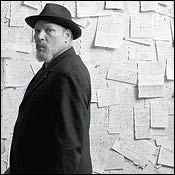By Boris Kachka, New York Magazine
 Q: Whose work first gave you the idea of what it was to be an artist?
Q: Whose work first gave you the idea of what it was to be an artist?
A: Dylan Thomas, in 1965, when I was a 20-year-old poet. It’s interesting, because I go back and I read Dylan Thomas and it’s obscure, the use of language and the rhythms. I spent years trying to figure out what the hell he was talking about. I still don’t know, but it sounds good. Around ’69, I discovered LeRoi Jones and the black poets of that era. But Thomas, the tweed jackets and the cool, booming reading voice! I actually did a reading of his work at a fashion show with two guys in tuxedos playing violin. That was in Pittsburgh in 1965. They paid me $50, and I thought, Oh, this is going to be easy. And it was another ten years before I made another $50.
Q: Which character did you most want to be in grade school?
A: Napoleon. His will to power, the idea of being a self-made emperor. This was at 13, eighth grade. Favorite kid’s books? I recall reading Nancy Drew, whatever I could get my hands on. I didn’t like the Hardy Boys.
Q: You dropped out of high school but spent a few years reading alone in a library. What struck you most?
A: Anthropology, history. Social anthropology. I remember Lévi-Strauss’s The Origin of Table Manners; I couldn’t read it, didn’t understand what it was about, so I put it back. I read Margaret Mead and worked my way up. I wasn’t too big on literature at that time. I was trying exciting things like theology —still trying to figure out the Trinity, how there could be three in one.
Q: First great biography you read?
A: Arna Bontemps. Washington’s Up From Slavery. And an odd book that now seems quite interesting was Moss Hart’s autobiography, Act One. I read that when I was 20 and didn’t know anything about theater.
Q: What’s your single greatest artistic influence?
A: The blues, without question. The earlier, the better: Charley Patton, Skip James.
Q: Do you listen to hip-hop? Favorites?
A: Tupac. He was head and shoulders above those guys. I started with Public Enemy and Tupac. I’ve got some OutKast, Snoop Dogg. Not stuff I listen to every day, but I don’t want to be culturally deficient.
Q: What would your colleagues be surprised that you like?
A: Opera. The German operas. Italian operas are cool, too, man, but I got into opera in 1963, before my first Bessie Smith record.
Q: What’s the first musical you ever saw?
A: That’s easy. Zorba, with Anthony Quinn, in 1983. I sat there and went, That’s Anthony Quinn! That’s Anthony Quinn! I was thrilled with the idea that that was him in person. He played everybody: Italian, Mexican, Eskimo. I thought it was remarkable.
Q: What plays made you think you wanted to write plays yourself?
A: Well, yeah, Ed Bullins—I think In the Wine Time, the first time I saw black characters of that type, what they would call in today’s language the underclass, presented onstage. That and Athol Fugard’s Sizwe Banzi Is Dead.
Q: What Hollywood star did you have a crush on as a boy?
A: That would be Melina Mercouri; I’m talking about 8 years old here! I’m a De Niro fan. I went eleven years without seeing a movie; the last one before that, February 1980, was De Niro and Scorsese in Raging Bull, and when I went back, it was Cape Fear, with De Niro and Scorsese. I picked up right where I left off at.
Q: Do you watch TV?
A: Very, very little. I’ve never seen Seinfeld, never seen The Cosby Show, I just don’t watch it. I saw half of Oprah one time. I’d rather read.
Q: What was the first play or work of art that you hated?
A: I’ve seen some terrible plays, but I generally enjoy myself. One play I walked out of, I have a tremendous respect for the author. That was Robert Wilson, something called Network, which consisted of Wilson sitting on a bunk, the dialogue of the movie Network looped in while a chair on a rope went up and down. After 45 minutes, I thought, Okay, well, I got this.
Q: What’s on your iPod?
A: Kurt Weill, three different versions of Threepenny Opera. A dance arrangement I just love. And then I got some blues, I got Brian Stokes Mitchell’s Man of La Mancha. Sting. I’ve got Stephen Foster, looking at it now. I’ve got Sarah Vaughan, I’ve got Rod Stewart, I’ve got some sermons.
Q: A sports figure who affected you?
A: My hero when I was 14 was Sonny Liston. No matter what kinds of problems you were having with your parents or at school, whatever, Sonny Liston would go and knock guys out, and that made it all right. He was my hero until 1969, when he got knocked out by Leotis Martin, and when he hit the canvas, it was like a giant oak falling. I couldn’t see the TV because I was crying. At the same time, I was crying because I was relieved, in the sense that I didn’t have any more heroes, and now I had to be my own hero. That was liberating in a way. I really felt like—I’m in charge now.